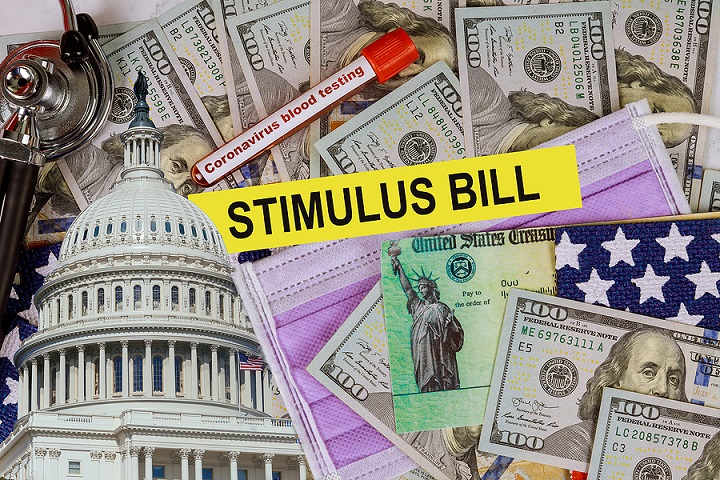Just in Time for the Holidays: Pandemic Relief for Individuals
Kirsch CPA Group
Dec 23, 2020

On December 21, Congress passed the Consolidated Appropriations Act of 2021 (CAA), which provides pandemic relief for individuals and businesses, as well as other tax and health-related provisions. White House aides had indicated that President Trump would sign the massive 5,500-plus page bill. However, late on December 22, President Trump indicated that he might not sign the bill because of some of the provisions and he asked Congress to make amendments to it.
The CAA also contains other bills within it, including the COVID-Related Tax Relief Act of 2020 (COVIDTRA). Highlights of the bill include:

Direct payments to provide relief for certain individuals. The CARES Act, passed earlier this year, provided for direct payments to certain people that the government called Economic Impact Payments (EIPs).
The COVIDTRA contains a new program, which it refers to as “additional 2020 recovery rebates” to people under certain income thresholds.
The provision provides a refundable tax credit to eligible individuals in the amount of $600 per eligible family member. The credit is $600 per taxpayer ($1,200 for married couples filing jointly), in addition to $600 per qualifying child. It “phases out” starting at $75,000 of modified adjusted gross income for individuals ($150,000 for married couples filing jointly and $112,500 for heads of household) at a rate of $5 per $100 of additional income.
The credit is available on taxpayers’ 2020 returns. However, the CAA provides for the U.S. Treasury Department to issue advance payments based on the information provided to the IRS.
Extended tax break for charitable donations made by non-itemizers. This break was created under the CARES Act, and the CAA extends it for another year. For 2020, individuals who don’t itemize deductions may take up to a $300 above-the-line deduction for cash contributions to qualified charitable organizations. (The deduction limit of $300 also applies to married filers.) The CAA would extend this rule through 2021, allowing individual cash contributions of up to $300 ($600 for married joint filers) to be deducted above-the-line to qualified charitable organizations.
Temporary special rules for flexible spending arrangements (FSAs). A cafeteria plan may permit the carryover of unused amounts remaining in a health FSA as of the end of a plan year to pay or reimburse a participant for medical care expenses incurred during the following plan year, subject to a carryover limit (currently $550). The CAA would expand the carryover period for 2020 and 2021. The provision also allows employers to extend the grace period for plan years ending in 2020 and 2021 to 12 months after the end of such plan year for unused benefits and contributions to health and dependent care FSAs.
In addition, an employer may allow an employee who stops participating in the plan during the calendar year 2020 or 2021 to continue to receive reimbursements from unused benefits or contributions through the end of the plan year in which the employee’s participation ceased, including any extended grace period. The CAA also provides a special carry-forward rule for dependent care flexible spending arrangements where the dependent aged out during the pandemic.
Larger tax credits for some parents. Under the tax code, to the extent the child tax credit (CTC) exceeds a taxpayer’s tax liability, the taxpayer is eligible for a refundable credit equal to 15% of as much of the taxpayer’s taxable earned income for the tax year as exceeds $2,500. In addition, the earned income tax credit (EITC) for lower-income taxpayers equals a percentage of their earned income.
For both purposes, earned income means wages, salaries, tips and other employee compensation, if includible in gross income for the tax year. Earned income also includes self-employment income, computed without the deduction for one-half of self-employment tax.
Under the CAA, in determining the refundable CTC and the EITC for 2020, taxpayers could elect to substitute the earned income for the preceding tax year if it’s greater than the taxpayer’s earned income for 2020. These changes apply beginning in 2020.
A special break for teachers who buy personal protective equipment (PPE). Currently, eligible educators are allowed a $250 above-the-line deduction for certain otherwise allowable trade or business expenses paid by them. The CAA provides that, not later than February 28, 2021, the IRS must, by regulation or other guidance, clarify that PPE, disinfectant and other supplies used for the prevention of the spread of COVID-19 are covered under the $250 tax break for teachers.
Much More
These are only some of the provisions contained in the bill to help individuals gain some relief from the pandemic. There are many other key provisions including:
- An extra $300 per week to people who are unemployed and receiving state aid
- Changes to disaster-related distributions from retirement plans
We’ll be covering more about the bill in the coming weeks if President Trump signs it. Contact us with any questions you may have.
More Resources

About The Author
Kirsch CPA Group is a full service CPA and business advisory firm helping businesses and organizations with accounting,…





